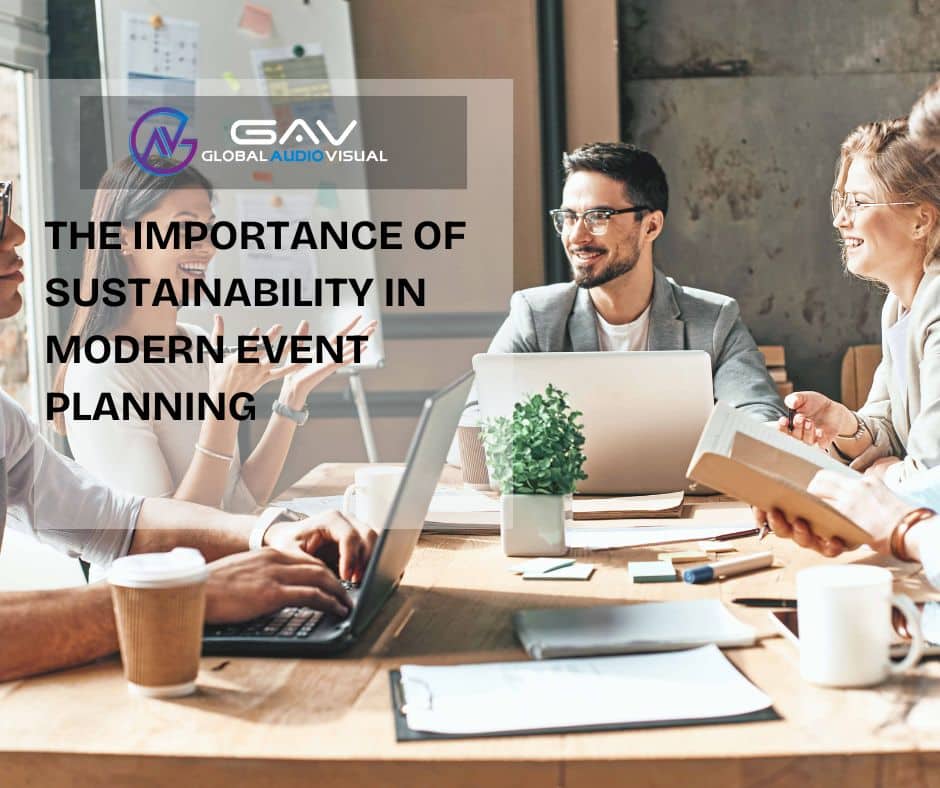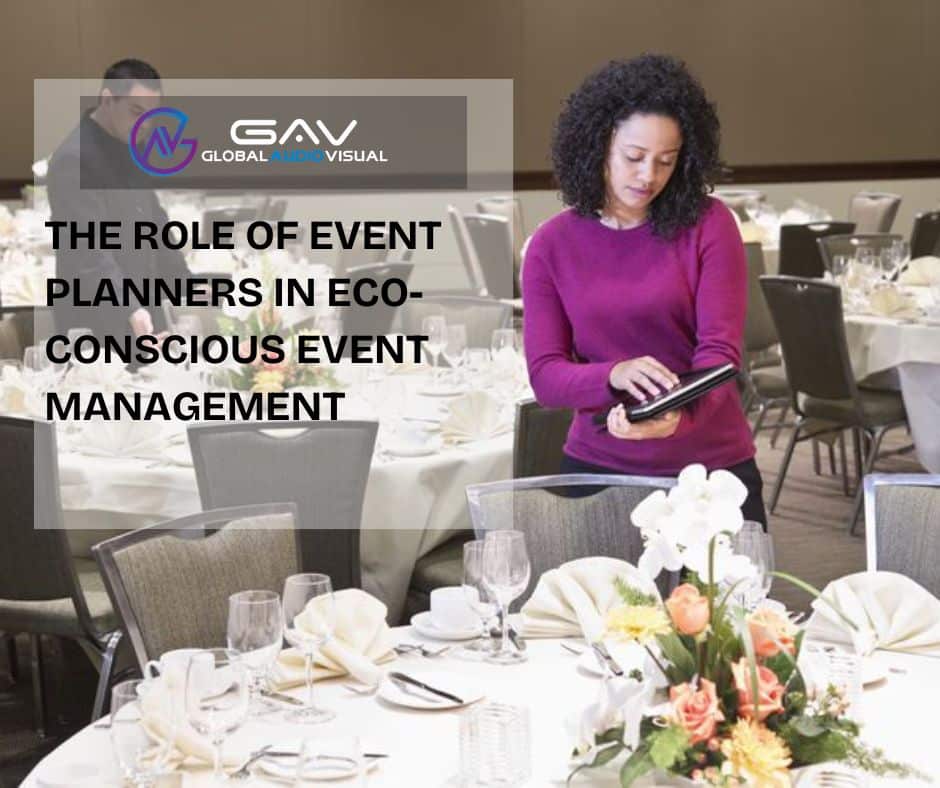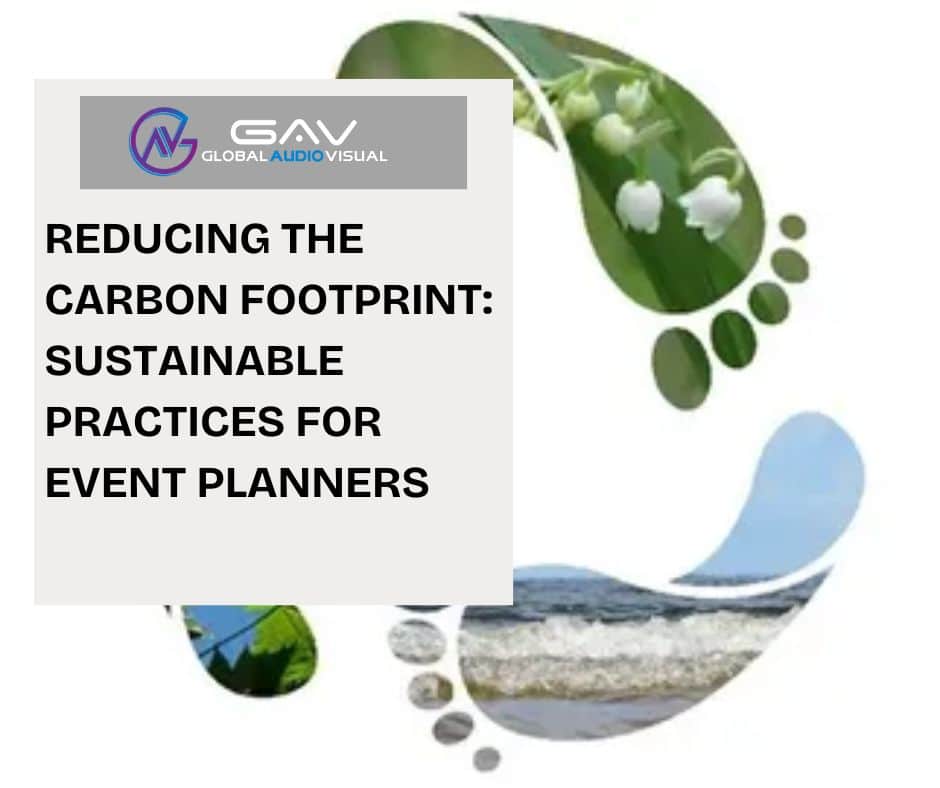In today’s world, where climate change and environmental degradation are pressing concerns, the concept of Sustainability in Modern Event Planning has gained significant traction. As the event industry continues to evolve, there is a growing awareness of the impact events can have on the environment. From waste generation to energy consumption, event planners are increasingly turning to sustainable practices to reduce their ecological footprint while maintaining the quality and success of their events. Holistic nutrition, too, plays a crucial role in this shift toward sustainability, with a focus on creating not just enjoyable, but environmentally conscious events.
This blog explores the importance of sustainability in modern event planning, how holistic nutrition fits into this, and the crucial role audio-visual companies can play in promoting sustainability efforts.
Why Sustainability is Critical in Modern Event Planning
In today’s world, sustainability is no longer just a buzzword; it’s a crucial aspect of responsible business practices across industries. Event planning is no exception. As awareness of environmental issues grows, more companies and organizations are shifting towards sustainable event planning practices. Whether you’re hosting a corporate conference, a wedding, or a large public event, integrating sustainability into the planning process can make a significant difference. Here’s why sustainability is critical in modern event planning and how it can positively impact your events.
1. Reducing Environmental Impact
Events, particularly large-scale ones, can have a significant environmental footprint. From transportation emissions and waste generation to energy consumption and resource depletion, the environmental impact of traditional event planning can be substantial. By adopting sustainable practices, event planners can reduce this impact.
For example, choosing venues with eco-friendly certifications, utilizing digital invitations instead of paper, or minimizing the use of single-use plastics are simple yet effective ways to reduce the environmental impact. Sustainable event planning also promotes the use of renewable energy sources, reduces food waste, and encourages local sourcing of products and services.
2. Meeting Consumer Expectations
Today’s consumers are more aware of the environmental and social impact of their choices. This awareness extends to the events they attend, with many attendees actively seeking out green events. According to recent surveys, attendees are more likely to support and participate in events that prioritize sustainability. By incorporating sustainable practices, you not only reduce your environmental impact but also align your event with the values of your audience.
By providing attendees with eco-conscious choices, such as sustainable catering options, carbon-neutral travel opportunities, and environmentally friendly event materials, you create a more appealing experience for those who value sustainability.
3. Cost Efficiency
Sustainable event planning can also lead to cost savings. While some sustainable practices might initially seem expensive, many can save money in the long run. For example, using digital communication instead of printed materials can save costs on paper, ink, and postage. Additionally, working with local suppliers can reduce transportation costs and contribute to the local economy.
Choosing energy-efficient lighting and minimizing food waste also offer potential savings. By reducing excess, making more efficient use of resources, and eliminating unnecessary materials, event planners can reduce the overall event budget while supporting sustainable goals.
4. Enhancing Brand Reputation
Incorporating sustainability into your event planning is a powerful way to enhance your brand reputation. Organizations that prioritize sustainable practices demonstrate to their clients, partners, and the public that they are socially responsible and forward-thinking. This can improve the perception of your company, attract environmentally conscious clients, and create goodwill within the community.
For businesses, being seen as a leader in sustainability can offer a competitive advantage. Attendees, clients, and partners are more likely to support companies that take active steps to mitigate their environmental impact and contribute to global sustainability efforts.
5. Legal and Regulatory Compliance
As sustainability becomes a growing concern worldwide, many governments and regulatory bodies are introducing new laws and policies related to environmental practices. Event planners who adopt sustainable practices are better prepared to comply with these regulations, avoiding potential fines and legal issues.
For example, some jurisdictions have introduced regulations requiring events to manage waste more effectively, limit energy consumption, or adhere to strict waste disposal laws. By staying ahead of these changes and adopting sustainable practices early on, event planners can ensure compliance and avoid unnecessary risks.
6. Supporting Social Responsibility and Community Impact
Sustainability is not just about environmental responsibility—it also includes social and economic dimensions. Sustainable event planning often involves engaging with local communities, supporting fair trade, and ensuring ethical labor practices. By promoting local businesses, sourcing food from sustainable farms, and ensuring that workers are fairly compensated, event planners contribute to social responsibility and create positive economic impacts within the community.
Events can also raise awareness about important social issues, like climate change or environmental conservation. By aligning your event with these causes, you not only create a more meaningful experience for your attendees but also contribute to global efforts to make a difference.
7. Innovation and Creativity
Sustainable event planning encourages innovation and creativity. In the pursuit of more eco-friendly and responsible practices, event planners are continually looking for new ways to reduce waste, optimize resources, and design more sustainable experiences. This often leads to the discovery of new technologies, practices, and solutions that can improve the overall quality of events.
For example, digital event platforms can reduce the need for physical materials, while virtual or hybrid events can minimize the environmental impact of travel. Additionally, upcycling, reusing materials, and creative decorations made from sustainable resources are ways to incorporate innovation into your event design.
8. Long-Term Impact and Legacy
Sustainability in event planning is not just about making a positive impact during the event itself; it’s about creating a lasting legacy. By reducing waste, supporting local economies, and promoting eco-conscious practices, sustainable events have a ripple effect that extends beyond the event. This influence can contribute to broader societal changes, encouraging others to adopt more sustainable practices in their own lives.
Creating sustainable events also sets a positive example for future generations of event planners, helping to establish sustainability as a core value in the industry.
9. Fostering Industry Growth and Collaboration
As sustainability becomes more critical in the event planning industry, it creates opportunities for collaboration among businesses, suppliers, and other stakeholders. By working together, event planners can create more sustainable solutions, share best practices, and support industry-wide efforts to reduce environmental impacts.
Industry collaboration fosters innovation, creates new opportunities for green business practices, and strengthens relationships with clients and partners who share similar sustainability goals.
10. Future-Proofing Your Events
The demand for sustainable events will only continue to grow in the coming years. By adopting sustainable practices now, event planners can future-proof their businesses and stay ahead of industry trends. Attendees, clients, and partners will increasingly expect event planners to prioritize sustainability, and those who don’t may find themselves at a disadvantage.
Investing in sustainability today ensures that your events will be aligned with the values of tomorrow’s attendees and stakeholders, securing your position as a leader in the evolving event planning landscape.
The Role of Event Planners in Eco-Conscious Event Management
Event planners are at the heart of the sustainability movement in the event industry. Their role is not only to plan a successful event but to ensure that it has a positive impact on the environment. By incorporating sustainable practices into their event design and execution, they can set the tone for others in the industry to follow suit. This commitment to sustainability is reflected in their choices of venues, vendors, and even transportation.
When selecting event spaces, for example, planners can prioritize venues that are already committed to sustainability through practices like energy efficiency, water conservation, and waste reduction. Opting for venues that support public transport accessibility also contributes to the reduction of carbon emissions, as guests are more likely to use eco-friendly transportation options. Furthermore, some venues offer sustainable AV installation and energy-efficient lighting, which significantly lower the event’s overall energy consumption.
Beyond choosing the right venue, planners must also consider their approach to waste reduction. By ensuring the availability of recycling bins and encouraging the use of reusable materials, they can minimize waste produced during the event. Additionally, planners can request that vendors limit single-use plastics and packaging, further reducing the environmental footprint of the event.
Holistic Nutrition and Sustainable Event Catering
When considering the catering aspect of event planning, holistic nutrition becomes an essential component of creating a sustainable event. Holistic nutrition emphasizes whole, plant-based, organic foods that nourish the body while also benefiting the planet. By incorporating these principles into event catering, planners can ensure that their events are not only health-conscious but also environmentally friendly.
Plant-based menus, for instance, have a lower carbon footprint than meat-heavy options, as the production of plant-based foods generally requires fewer resources and generates less waste. Holistic nutrition also encourages the use of locally grown and seasonal produce, which reduces the need for long-distance transportation and lowers carbon emissions. By focusing on sustainable event planning in terms of food, event planners can contribute to sustainability efforts and provide guests with nourishing, eco-conscious meals.
Moreover, the reduction of food waste should be a top priority. This can be achieved by working with caterers who have a commitment to sustainability, ensuring that food is prepared in quantities that match guest attendance, and exploring options for surplus food to be donated to local organizations. In this way, event planners can not only reduce food waste but also make a tangible contribution to the community.
Eco-Conscious Technology and AV in Event Planning
As events become more sophisticated, so too does the technology used to make them engaging and immersive. However, traditional AV setups, including sound systems, lighting, and video walls, can consume significant amounts of energy and generate considerable waste. This is where audio-visual companies can play a pivotal role in promoting sustainability within the industry.
One key aspect of sustainability in events is the efficient use of energy. Modern AV equipment, such as energy-efficient lighting, sound systems, and projectors, can significantly reduce the energy consumption of an event. In addition, utilizing AV equipment rental services for events ensures that technology is reused rather than discarded, reducing the need for new equipment production and minimizing electronic waste.
Additionally, when it comes to setting up platform rental and stages, opting for reusable and modular designs is a sustainable choice. These platforms can be used multiple times, reducing the amount of material waste generated by one-off installations. Moreover, with an audio-visual installation that includes energy-efficient solutions, planners can ensure that their events are both high-tech and eco-friendly.
For larger events, the best way to build a video wall or set up large-scale projections is by working with audio visual companies that specialize in energy-efficient displays and lighting. These companies not only help minimize power consumption but also offer sustainable alternatives such as LED lighting and low-energy sound systems.
Reducing the Carbon Footprint: Sustainable Practices for Event Planners
Event planners looking to further reduce their carbon footprint can take several practical steps to make their events more sustainable. One of the most effective strategies is by encouraging the use of public transport for event attendees. Many venues offer shuttle services or are located near major transit hubs, which can significantly reduce the number of cars on the road. This not only helps reduce energy consumption but also limits the carbon emissions associated with individual travel.
In addition to encouraging public transport, planners can work with venues and suppliers to minimize the environmental impact of travel by selecting local vendors whenever possible. By sourcing food, decorations, and services locally, planners help reduce the carbon emissions associated with transportation. This is especially important for large-scale events, where the transportation of materials and goods can quickly add up to a substantial environmental impact.
Sustainable practices can also be incorporated into the waste management strategy. Planners should ensure that events have easily accessible recycling bins and that waste is sorted efficiently. By minimizing the amount of waste sent to landfills and ensuring that recyclables are properly processed, event planners can help reduce their events’ environmental footprint. Furthermore, collaborating with suppliers who specialize in sustainable event products—such as compostable cutlerhttps://www.globalavisual.com/y and recyclable signage—can ensure that the event remains eco-conscious from start to finish.
Conclusion: Why Sustainability in Modern Event Planning Matters
In conclusion, the importance of sustainability in modern event planning cannot be overstated. As the event industry continues to evolve, so too must its approach to environmental responsibility. From eco-conscious catering options and holistic nutrition to AV installation and waste reduction strategies, there are countless ways that event planners can reduce their environmental impact while creating memorable experiences for their clients.
By adopting sustainable practices, event planners can contribute to adopting eco-friendly practices that align with their client’s values and goals. In doing so, they not only help protect the planet but also make a positive impact on their communities and the broader event industry. From recyclable materials to energy efficiency in AV setups, the future of event planning lies in making responsible choices that benefit both people and the planet.
If you’re looking for a partner who shares your commitment to sustainability efforts, look no further than Global Audio Visual. Our focus on eco-conscious solutions and sustainable event planning makes us the perfect choice for your next event. Whether it’s sound system rental, speaker rental, or portable stage rental, we are dedicated to ensuring your event is both impactful and environmentally responsible.



